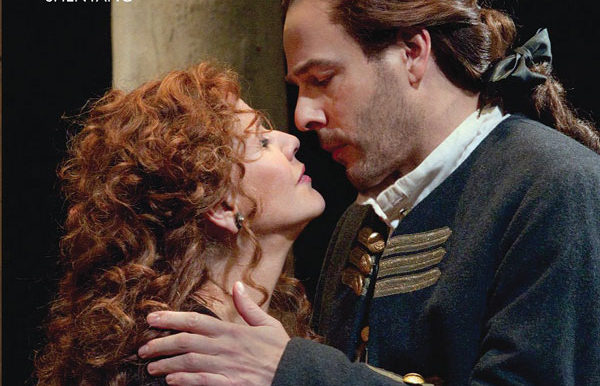
Handel: Rodelinda
DAVID J. BAKER, CRITIC’S CHOICE:
One happy discovery in this video, based on a Metropolitan Opera Live in HDtransmission, is how much Handel likes the small screen. In this packaging of his Rodelinda, the unfriendly size of the Met auditorium is neutralized; vocal subtleties achieve their own high definition, and we can better appreciate the period theorbo and recorders that conductor Harry Bicket adds for flavoring in the pit. Via this medium, characters give every sign of communicating with one another, while the producer’s agile camera focuses tightly on individual expressions to register the characterizations that are so crucial to Baroque opera’s theater of personality.
It also helps that this matinée in December 2011 finds Renée Fleming, as Rodelinda, and countertenor Andreas Scholl, as the deposed king Bertarido, in stronger vocal form than when the revival opened a month earlier. The soprano invests her high-speed passagework with convincing venom in arias such as “Morrai, sì” and, when the occasion demands, spins a subtle line, easing effortlessly in and out of trills — at one point while carrying her son, Flavio, played by Moritz Linn. Her portrayal of the attractive, frantic heroine has matured to include moments of regal composure that offset excesses such as the gamble in Act II with her child’s life.
With his poised legato and an idiosyncratic mix of bright and shadowy timbre, Scholl masterfully shapes the hero’s mournful “Dove sei, amato bene?” and “Con rauco mormorio.” His countenance, here unrelievedly dour, would benefit from similar flexibility. The singer’s mid-range recitatives are more assertive than when heard in the house, but the defiant concluding aria, “Vivi, tiranno,” still lacks ideal speed and incisiveness.
Joseph Kaiser, in the tenor role of Grimoaldo, and countertenor Iestyn Davies, as Unulfo, are welcome newcomers to the cast, while mezzo Stephanie Blythe repeats her effortlessly commanding Eduige. Bicket’s conducting, cultivated and eloquent, sometimes errs on the side of accommodation.
One can tire of director Stephen Wadsworth’s indiscriminate deployment of foot traffic, supportive listeners and eavesdroppers — visual camouflage for Handel’s serial solo-aria structure — and he waxes sentimental, especially in the overuse of little Flavio. But his production is as telegenic as at the 2004 premiere, cinematic in its fluid use of revolving and elevator stages and refreshing in its focus on storytelling rather than conceptual novelty. Painterly sets by Thomas Lynch, enhanced by Martin Pakledinaz’s smart period wardrobe and Peter Kaczorowski’s lighting effects, conjure an eighteenth-century Lombardy bathed in rich autumn hues and a dose of Merchant Ivory chic.
Viewers eager for a peek backstage can check out the introduction and intermission interviews by the engaging Deborah Voigt in the role of HD host. The format could use some work, to avoid the abrupt dismissals by the interviewer, which sometimes leave the singer or conductor standing, mike in hand, or awkwardly shuffling sideways out of camera range.